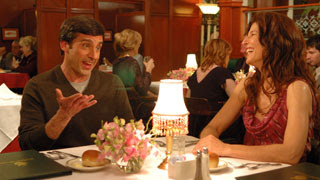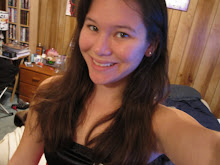Ganeku, Samantha
English 312
Professor Wexler
13 December 2008
In the movie Minority Report, the main character played by Tom Cruise, the control implemented by the government helps keep citizens within the law. The futuristic pre-crime detection unit monitors everyone and “pin points” who will commit a crime and where it will occur, before it actually happens. Without the crime occurring, one is unable to prove their innocence or guilt, this presents a loss of freedom and rights in an extreme sense. In a dystopian society, it is the lack of freedom and rights that are the core of these cultures.

As seen through Frederick Douglass’ Narrative of the Life of Frederick Douglass, the stripping of rights affects the slave community. While as a whole, the slave community remains in the dark about the real wrongs being perpetrated on their group, Douglass has had his eyes opened up. It is because he learns to read that he is able to understand the real implications of enslavement. Similar to the human race in Planet of the Apes, African American’s are seen as inferior and ignorant. They are nothing more than tools to be used by those in power to control. By withholding knowledge from groups of people, it becomes easier to control whole groups.
History is very similar, in the sense without a history or a background; there is a missing piece of identity. For Douglass, once he realizes what is really behind the enslavement of African Americans, he gains a brighter outlook that he often wishes he did not have. While clearly knowledge is power, it can also be an unwanted burden as seen in the case of Frederick Douglass. For Douglass, he has to constantly walk around with knowledge that creates a prison that constantly follows him. He could speak out and tell others the secrets he has uncovered, he would be unable to find others who would believe him or go along with a revolution. It is because of his inability to share his new found knowledge that he becomes trapped within a society that has no real written freedom.
Like Orwell’s 1984, when the crowd of people screams at the projection during Hate Week, propaganda is used to entice such a response. Similar to Douglass in the sense that the government withholds or manipulates information released to the public, the governing body in 1984 present’s information in ways that enables them to gain more control over the common person. Today is no different, within the United States; information is withheld or manipulated by those presenting it to the masses. Whether it is the writers of history books or the local newscasters, there is an agenda behind the information being released.

Propaganda is a powerful tool within any society. In particular it is seen in the United States during times of war. It is the rationalization that the government is using its power to protect us from harmful information. Furthermore, it was seen more recently when China was preparing for the Olympics. The Chinese government censored news of mobs protesting during the torch relay and presented the image of a jovial relay procession. To keep the mass populations at ease/peace, governments are willing to go the extremes of censoring information released to the public because it enables them to control the general sentiment in their favor regarding certain matters.
As Jameson points out in his article, for a revolution to be successful, it must be done on a mass scale. In larger numbers crowds have more influence over those who seek to hush their protests or seek to oppress them. For Douglass, 1984’s Winston, and the Planet of the Ape’s Taylor, they would need to get a group of people first listen to them and then follow their lead. However, the only person really successful enough in this regard is Taylor, who gets others to believe him and even defend him.
Jameson further tries to say that for equality, we must be willing to think beyond the individual. Douglass tried to be conscious of this fact. For other slaves to survive their lifestyle, they needed to believe the propaganda presented to them. Once other slaves started to believe in them, their white masters would try to find other ways in which to punish and further oppress them; worse, the masters would even seek to make examples out of them to further discourage any other uprisings. This would strike the hope from those that may seek for something more, as well as the possibility for groups to band together to rebel.
Within his slave community and his own life, Douglass was constantly under the watchful eye of Big Brother in its many forms, whether as a foreman, a master, or fellow slaves, someone was always watching him. In this panopticon, Michelle Foucault would have argued that the knowledge that Douglass was being observed, should have prevented him from doing anything that was forbidden; however knowledge of the Underground Railroad and the ability Douglass gained to read proves that there were some flaws. As a whole, however, the slave community would not rebel for this reason. The idea that one is being observed prevented many slaves from running away, as did the knowledge of what would happen should they be captured.

Like the workers presented in the movie Metropolis, slaves became drones in the sense they had daily chores that they preformed like clockwork. They had no real time for leisure or pleasure, instead they constantly needed to work and be a part of the machine. In this system, there was no “middle class”. There is only the owner/master and the slave. While one surely depends on the other, the hierarchy could not be any clearer. Though Douglass himself was able to read and function as more than a worker, he could clearly not be an owner/master. For Douglass and the society he lives in, there was no in between.
The ideas presented in Gattaca the movie, that the strongest and most superior get the advantages and the privileges. For Douglass, a similar concept ruled his time. The survival of the fittest was the ideal words to live by. One either had to be strong or have an extremely smart mind. While Douglass still had to experience the labor of slavery, he was also able to experience the freedom of working for a wage for a time. He used a combination of his mind and his body to gain and experience advantages many in his position only dreamed of. However, within his freedom, he was still stuck within the production relationship. Douglass was still working in what Althusser would consider the Reproduction of Labour-Power. Douglass still had to produce a product to obtain these advantages and experiences. He was not within the society where he followed the rules of a slave in the strictest sense, he moved into a different society where he needed to work and produce a product to gain a wage in exchange for his freedom. The value of the work he produced was then assessed by his employer/new owner.
Daily Lessons on Class details this relationship in that while Douglass may seek to get away from being the worker or slave, he is stuck within a cycle that will only continue and follow wherever he goes. Douglass would be what the authors Ebert and Zavarzadeuh would consider Wednesday. He represents the “playful in-between-ness” with his ability to be both a slave and a working functioning member of a different society. He is able to understand both worlds and he is stuck in this land where he does not fully fit within either one; furthermore, he is at a state in which neither side would claim him as one of their own.

In addition, Daily Lessons on Class further states that “freedom is realized only through revolution making a new society not bound by wage labor. For Douglass, this would be questionable if within the society he would be able to ever be equal when monetary value was no longer a factor. Rather, it would be more likely that Jameson’s ideas that a mass revolution would be able to create such a state for him. Revolution on a mass scale, where all slaves were involved in the outcry of the wrongs done to them, could create a new society if only they were able to adopt a sense of communism.
With Jameson’s ideas in mind, it would be possible for Douglass to break out if he could encourage others in their masses to join him in an uprising. Like those that fight today overseas for freedom, they sacrifice theirs so citizens of the United States can continue to enjoy theirs. These soldiers do not think of themselves, rather they think of the cause they represent. For the slaves to join Douglass, they had to believe that what they fought for would benefit maybe not themselves, but those that would come after them. They needed to be willing to sacrifice their lives in most cases to be able to fully commit to the cause. However, Douglass never asked this of his fellow slaves. He understood the burden he carried was too much for him, and it often weighted heavy on his own mind. He did not seek to pass this burden onto others or jeopardize the relative peace in which they lived.

Douglass’ dysptopia was one in which it was a struggle to survive. He ran the risk of getting beaten, starved, and worse if he did not please his master. Within the life of a slave, he was able to gain the ability to do things unheard of for others. While Douglass was the rare exception, he still was often stripped of rights and freedoms based on his “station” within the society he lived in.
Works Cited
Althusser, Louis. "Ideology and Ideological State Apparatuses." WebTeach-English 312. CSUN. 12 Oct. 2008
.
Boulle, Pierre. Planet of the Apes. Trans. Xan Fielding. Westminster: Del Rey, 2001.
Douglass, Frederick. Narrative of Frederick Douglass : Prestwick House Literary Touchstone Edition. New York: Prestwick House, Incorporated, 2004.
Foucault, Michel. "Discipline & Punish (1975), Panopticism." Michel Foucault. Discipline & Punish (1975). 1 Sept. 2008 .
Jameson, Frederic. "The Politics of Utopia." New Left Review. 2 Dec. 2008 .
Minority Report. Dir. Steven Spielberg. Perf. Tom Cruise. DVD. 2003.
Orwell, George. 1984. New York: Plume, 2003.











